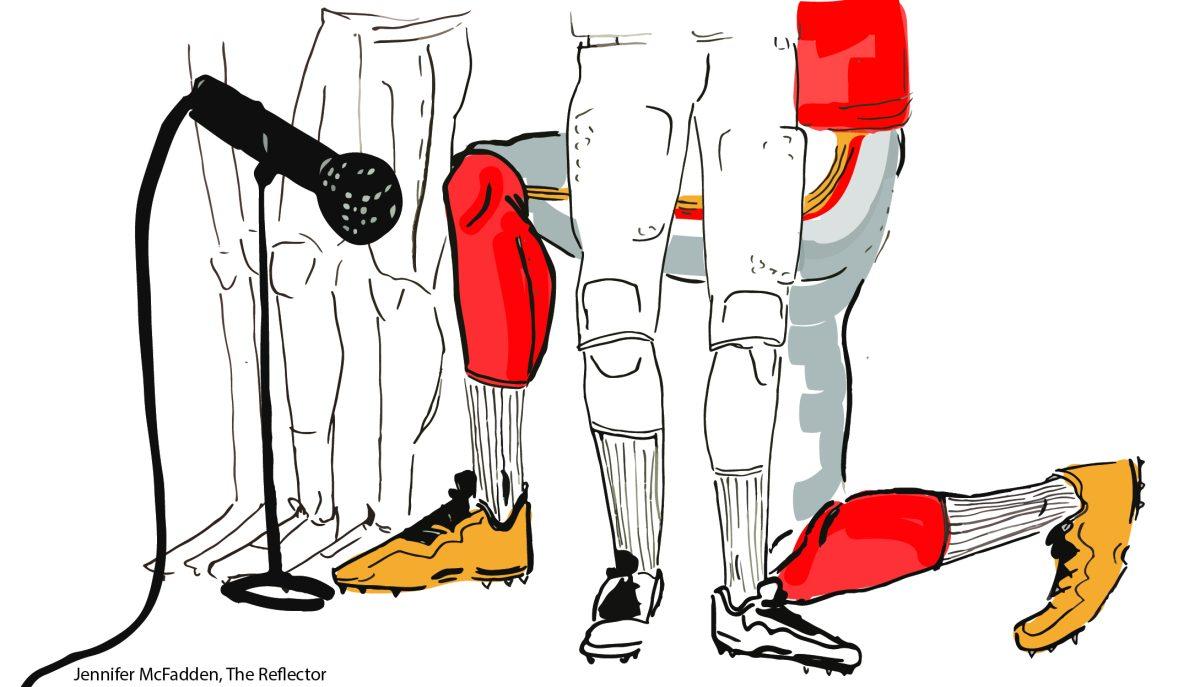On Aug. 14, 2016, Colin Kaepernick did something during a preseason game that angered many: he sat down during the national anthem.
Several days to follow, the media frenzy was in motion. Kaepernick addressed the media in the locker-room after a preseason game.
“I am not going to show pride in a flag for a country that oppresses black people and people of color. To me, this is bigger than football and it would be selfish on my part to look the other way,” Kaepernick said. “There are bodies in the street and people getting paid leave and getting away with murder.”
Many more athletes began joining Kaepernick in protest and he announced he would donate one million dollars to charities focusing on racial issues.
Media outlets and multiple individuals, both within the NFL sphere and outside of it, grilled those who remain seated or kneel in solidarity with Kaepernick.
Some of the notable backlash received by these protestors came from former Super Bowl winner Trent Dilfer, Hall of Famer Jim Brown and President Donald Trump.
With such a variety of criticism coming from different sources, one has to wonder why everyone is so angry over the protests.
According to The Atlantic, The Guardian and The Washington Post, the most cited reasons for the outrage is perceived disrespect. Disrespect not only for the U.S. and the flag but also disrespect for the troops and law enforcement officers who risk their lives to serve under the flag.
Kaepernick stated from the beginning that the protest was not aimed to detract from the military or even the country as a whole, but the protests were aimed at shedding light on a flawed justice system and the discrepancies between daily lives of white Americans and Americans of color.
With the start of the 2017 NFL season, we see the national anthem protest continue to spread. With lines of division over the issue still firmly drawn in the sand, I wanted to shed light on what I think the real problem is with national anthem protests.
People care more about these athletes kneeling than they care about the reasoning behind it. These players have a larger platform than most Americans and are trying to use it positively to give a voice to those who face injustice.
Unfortunately, that message does not resonate with individuals who cannot empathize with the struggles fellow Americans who have a different skin color may face.
If we dig deeper, the root causes of this misunderstanding are division and selfishness. I often see people angrily complain about how the media is creating division and fanning the flames of racism.
To an extent that is true, but placing all blame on the media is taking the easy way out. Responsibility for division must first be taken at the individual level. We allow ourselves to be divided based on frivolous things and then demand those on the opposite of us come to our side for unity to abound.
The media cannot cover what is not there. We cannot be upset the media is giving division a primetime slot on the news when we are responsible for it. Division stems from selfishness.
We all have our respective positions and we refuse attempts at understanding someone with a position contrary to our own. It is always the job of someone else to understand us—not the other way around. An eye for an eye and the whole world is blind.
The same logic applies: if the responsibility to understand is constantly ignored, then there will be no understanding. We are selfish, not only because we do not want to understand, but also because we are too comfortable where we are.
It is too easy to ignore the struggles of someone else, the motivations for why someone might be a Democrat instead of a Republican, or why someone chooses not to attend church.
We do not want to reach out to those different than us. It makes us uncomfortable, it may mean breaking our ordinary routine or being inconvenienced.
The real problem with national anthem protests is not that you perceive them as being disrespectful, it is that you lack the compassion, empathy and love to see beyond your own understanding of the issue.
There will always be turmoil and strife in the U.S., and globally, until we all realize other humans mean more than superficial divisions that keep us apart. While this does not mean we cannot have our preferences and belief systems, it means we should not be so entrenched within them we fail to see the significant importance of walking a mile in someone else’s shoes.





















































































